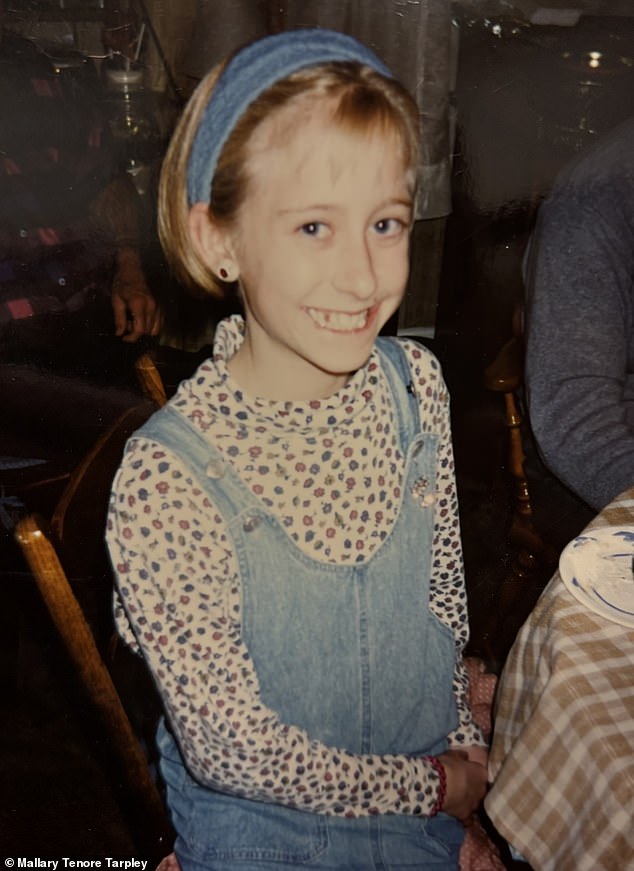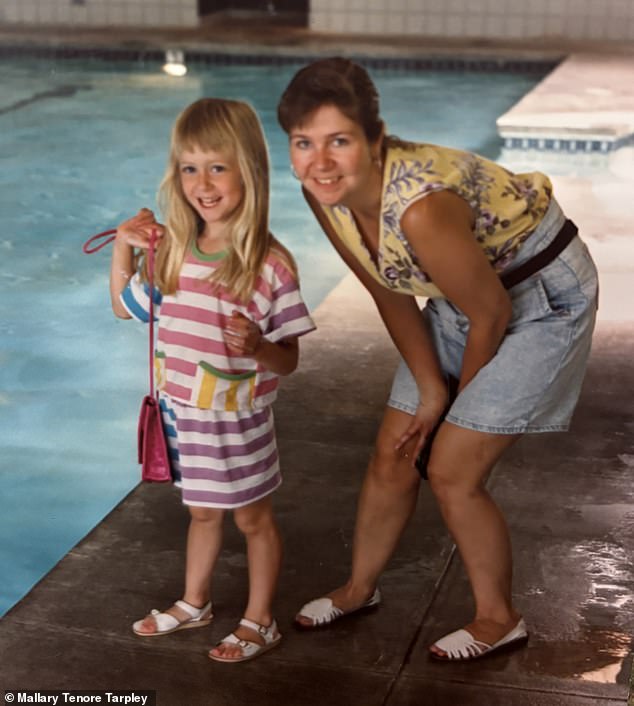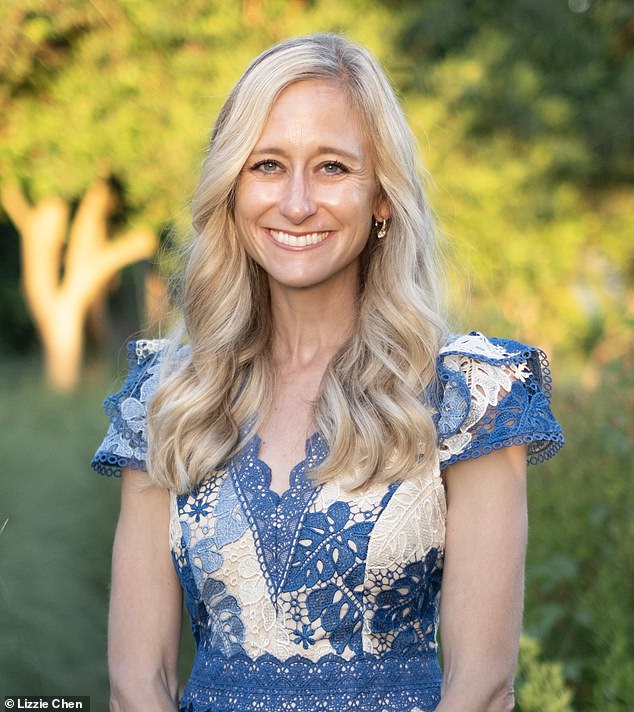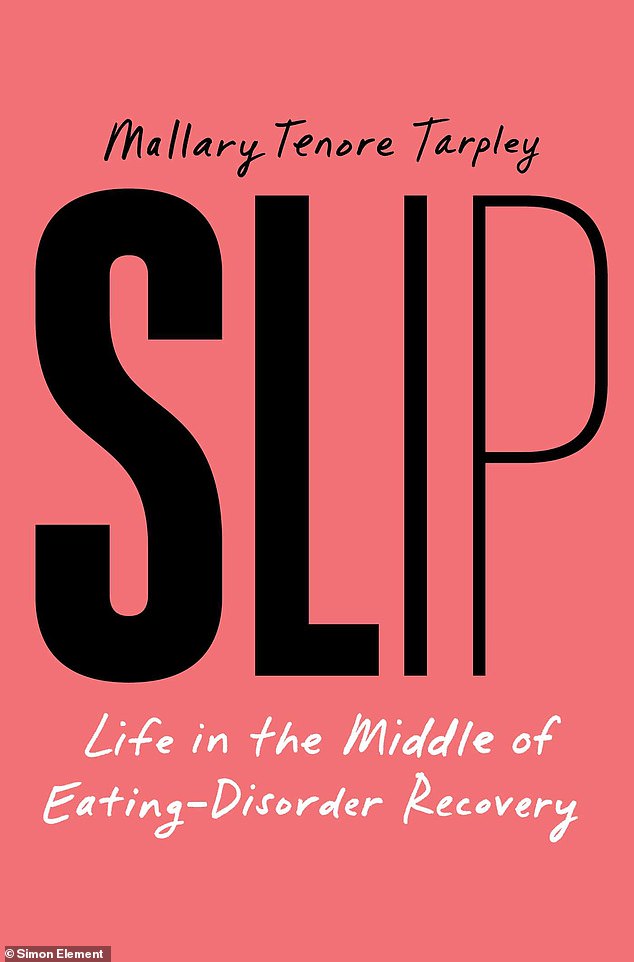When journalist Mallary Tenore Tarpley set out to write a book about her struggles with an eating disorder, she was dismayed to learn that the children of adult sufferers are 11 times more likely to develop one.
As a recovering anorexic, her thoughts immediately turned to her daughter, Madelyn, 9, and her son, Tucker, 7.
Tarpley knew that, after decades living with her illness, she was not ‘cured’ but merely in recovery, and she worried that she would pass it down to them.
This is just one of the issues that Tarpley, 40, addresses in her book, ‘Slip: Life in the Middle of Recovery.’
And while she may not be able to change her children’s genetic predisposition, she is confident she can off-set it by fostering healthy attitudes toward food.
Speaking exclusively to the Daily Mail ahead of her book’s publication in August, she said: ‘I don’t have any control over the genetic factors, but I do have influence over the meals and snacks I provide at home.
‘I can also explain the importance of self-acceptance over the so-called image you present to the outside world.’
The mother-of-two believes that other parents can and should take measures to guard against disordered thoughts about eating, regardless of whether they have had any themselves.

Pictured: Mallary Tenore Tarpley, 40, with her husband, Troy, 44, and children, Madelyn, 9, (left) and Tucker, 7 (right)

Pictured: Tarpley as a young girl, shortly before she developed an eating disorder after the death of her mother
‘It’s important to be mindful when you talk about food, bodies and exercise,’ Tarpley added. ‘It’s easy to send confusing messages that may have a negative effect on children.’
Tarpley, an only child, developed anorexia at 12, a year after her mother, 36, died of breast cancer.
Looking back, and with the benefit of extensive therapy, she believes her illness was a subconscious attempt to take control of at least one aspect of her life – the food that she ate – while everything else seemed to spiral.
Growing up in Boston, Massachusetts, the competitive culture fostered in her school didn’t help, nor did the practice of lining up to be weighed during health class – a heavier weight meant a lower score, which got recorded on a chart.
Tarpley recalled: ‘As always, I wanted to ace the test.’ Whatever number registered on the scales, she never felt good enough. She could do ‘better’, she could be lighter.
Class weigh-ins may be a thing of the past. But, according to Tarpley, prejudice against people’s body types – large or small – remains a fact of life.
She points to a recent time when Madelyn, who is physically slight, returned from school delighted that some of her friends had called her ‘skinny’.
‘They seemed to think it was a good thing,’ Tarpley said. ‘It didn’t strike me as a healthy attitude.’
In an approach that she would advise other parents to follow, she tried to remove the value judgement from the notion of Madelyn’s size by telling her, ‘Yes, you are on the thinner side, but that’s not a good or a bad thing.’
She explained: ‘I wanted to neutralize the idea of some body shapes being better than others.’
Another time, Tucker spotted a woman in the street and described her as ‘fat.’
Tarpley said: ‘My initial reaction was to shush him and say, “Don’t say that!”
‘But I didn’t want him to associate larger or smaller bodies with something negative or positive.
‘So, I told him, “Some bodies are smaller than others and vice versa.” I didn’t want to demonize larger bodies.’

Pictured: Tarpley with her mother who died of breast cancer at the age of 36 in 1994

Pictured: Tarpley, an only child, with her mother and father when she was a young girl

Pictured: The wooden mirror that Tarpley made for Madelyn surrounded by empowering words about her personality, not her looks
Girls are three times more likely to develop anorexia or bulimia than boys.
But Tarpley, a professor at The University of Texas at Austin’s School of Journalism and Media, advises parents to track all their children’s social media habits, monitoring accounts for ones that may erode their child’s sense of self-worth.
She says that parents should encourage their kids to be skeptical about online search results for popular terms such as ‘wellness’ and ‘clean eating.’
Tarpley noted: ‘Too often, fad diets and disordered eating are subject to algorithms, so certain ads may come up on their social media feed that can be damaging.
‘Children need to know “wellness,” should cover things like sleep and stress.’
There are also simple, practical measures parents can implement to encourage their children to have high self-esteem and a good self-image.
For example, Tarpley decorated a mirror in her daughter’s bedroom with wooden petals bearing words that reflect Madelyn’s character, not her looks.
The petals are painted with words of empowerment such as ‘creative,’ ‘imaginative,’ ‘unique’ and ‘smart’.
She explained: ‘Every time she looks in the mirror, I want her to see something other than her physical attributes.
‘Kids need to know they are much more than just their physical appearance.’
As for the food in her household, whether it’s chicken nuggets, ice cream or vegetables, the dishes are never ascribed a moral value by being labeled ‘good’ or ‘bad.’
Instead, Tarpley simply refers to food as fuel – a substance that our bodies need to function.
‘I’ll tell the kids something along the lines of, “A carrot is not inherently better than carrot cake” or “A cherry pie isn’t inherently worse than a bowl of cherries,”’ she said. ‘It’s eating disorder speak, but it’s also eating disorder prevention speak.’
She loads her children’s plates with food but encourages them to stop eating when they feel full.

Pictured: Tarpley, who told the Daily Mail, ‘It’s easy to send confusing messages about food that may have a negative effect on children’

Pictured: The Tarpley family near their home in Austin, Texas. Tarpley is trying to make sure her children don’t develop eating disorders in later life

Tarpley, a professor at The University of Texas at Austin, has written a book about her eating disorder that also offers advice to parents
Another trick she shares is to only allow them to eat cheese or fruit if they say they are hungry before mealtimes.
‘I’ll say you can take what you like from the fruit basket or cheese drawer in the fridge, but we’re not having candy bars or ice cream before dinner.’
It isn’t just children’s behavior surrounding food that can be indicative of a problem.
Over-exercising is another tell-tale sign, according to Tarpley, who has advice for the parents of tweens and teens.
‘It’s difficult to raise the topic,’ she admits. ‘But it’s essential not to turn a blind eye [to the warning signs].’
Those signs can include a child who no longer enjoys a sport but starts doing it obsessively or who withdraws from people and activities.
‘It’s all about parents keeping the conversation open, no matter how hard it may seem,’ she said.
It’s an uphill battle in this world of Ozempic and barely-there Instagram influencers, but Tarpley hopes her advice will help parents nip a possible eating disorder in the bud and spare children the decades of suffering that she herself has endured.
After all, she said: ‘I know only too well the devastation it can cause.’
‘Slip: Life in the Middle of Recovery,’ (Simon Element, published August 5) is available for pre-order.












